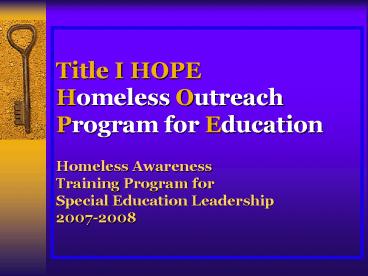Title I HOPE Homeless Outreach Program for Education - PowerPoint PPT Presentation
1 / 15
Title:
Title I HOPE Homeless Outreach Program for Education
Description:
Sharing housing due to loss of housing or economic hardship. ... Living in cars, parks, public spaces, abandoned buildings, substandard housing, ... – PowerPoint PPT presentation
Number of Views:32
Avg rating:3.0/5.0
Title: Title I HOPE Homeless Outreach Program for Education
1
- Title I HOPE Homeless Outreach Program for
Education - Homeless Awareness
- Training Program for
- Special Education Leadership
- 2007-2008
2
Special Education Children and Youth
Experiencing Homelessness Have the Right to a
Free and Appropriate Public Education
3
The Scale of Homelessness
- Up to two million people will experience
homelessness this year. - Approximately half will be children and youth.
- The fastest growing segment of the homeless
population is families. - National Law Center on Homelessness and Poverty
4
Who is homeless?
- An individual who lacks a fixed, regular, and
adequate nighttime residence, including children
and youth - Sharing housing due to loss of housing or
economic hardship. - Living in motels, hotels, trailer parks, or
camping grounds due to lack of alternative
adequate housing. - Living in emergency or transitional housing.
5
Who is homeless? (contd)
- Children and youth
- Abandoned in hospitals.
- Awaiting foster care.
- Having a primary nighttime residence that is a
public or private place not designed for, or
ordinarily used as, regular sleeping
accommodations. - Living in cars, parks, public spaces, abandoned
buildings, substandard housing, bus or train
stations. - Migratory children meeting the homeless
definition.
6
Possible Signs HomelessnessThese
characteristics could be attributed to students
with other issues as well as those students
experiencing homelessness.
- Attendance at several schools
- More than one family at the same address
- Attention seeking behavior
- Hunger hoarding of food
- Poor hygiene grooming
- Sleeping in class
- Inappropriate dress for the weather
- Some common statements used by homeless students
include - Weve moved a lot
- We are staying with relatives/friends while
looking for a place - Were going through a bad time now
7
McKinney-Vento Homeless Education Act, 2001
(P.L. 107-110, Title X, Part C)
- Reauthorizes the McKinney Act, originally enacted
in 1987 - Requires
- enrollment,
- attendance, and
- success for children and youth experiencing
homelessness - Still remains the only federal legislation that
addresses homelessness
8
Enrollment McKinney-Vento Act
- Requires public schools to immediately enroll
students experiencing homelessness regardless of
documentation, such as - Proof of residency,
- School records, or
- Immunization records
- Birth certificate
- not being available at the time of enrollment.
9
EnrollmentMcKinney-Vento Act
- Allows students to stay in their school of
origin, if parent/unaccompanied youth prefers and
is feasible. - Requires public notice of educational rights of
homeless children and youth be posted in all
public schools. - Requires unaccompanied youth be provided
educational access.
10
ENROLLMENT CHANGES
- NO ENROLLMENT VOUCHERS
- Use the Clark County School District
- CCF-705 Registration Form as the
enrollment tool for homeless students - Information maintained and retained
on SASI - The Homeless Field indicates residency
11
McKinney-Vento Requires Expedited Services
- Immediate identification
- Enrollment on CCF-705 as homeless according to
residency criteria - Referral to counselor
- Entry into SASI as homeless
- Special Education identification
- Pre-K enrollment
- Offer School of Origin, if applicable
- Nutrition
- Access to extra-curricular activities
12
Expedited Special Education Servicesfor
Students Identified as Homeless
- Communication with Title I HOPE Advocate
- Transportation is routed through
- Title I HOPE
- Expedited Evaluation
13
Title I HOPE supports McKinney-Vento by
providing
- Free breakfast and lunch
- School supplies and backpacks
- Transportation to School of Origin
- Birth Certificates
- Curriculum support at school sites
- Summer School Tuition Grant
- After-School Enrichment Program
- Clothing
- Project S.O.S. (See Our Smiles)
- College Scholarships
14
Education is the key to breaking the cycle of
homelessness
15
Title I HOPE855-6682
Myra Berkovits Coordinator Susan
Goldman SE Region Project Facilitator Jeanne
Lange SW Region Project Facilitator Sara
Duncan NE Region Project Facilitator Dee
Fite NW Region Project Facilitator Jura
Leak East Region Project Facilitator Trudy
Coleman Student Success Advocate Willie
Springfield Office Specialist II Juan
Arias Utility Worker






























